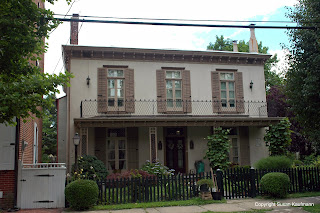The slim brick rowhouses of Burlington's historic Wood Street are interrupted by a wider and squatter cream colored stucco residence labeled "Grant House." While it was never actually the home of then-General and later President Ulysses S. Grant, one of his visits there might have saved his life.
A graduate of West Point who fought in the Mexican War, Grant rose to the rank of commanding general of the Union Army during the Civil War. Justifiably concerned about the safety and welfare of his family, he moved his wife Julia and four children to the house at 309 Wood Street, in Burlington. His children attended classes at the school, and by all accounts, the family had an uneventful stay in town. Though he spent little time there himself, the General would visit when he could.
Shortly after the surrender of Confederate forces at Appomatox in April 1865, Grant traveled to Washington D.C. for a cabinet meeting. President Lincoln invited the Grants to join him and his wife for a night at the theater, but the General declined, knowing that Julia disliked Mary Todd Lincoln's erratic behavior and would refuse to go. Of course, you're not going to tell your boss that your spouse thinks his wife is crazy, so rather than telling Lincoln the truth, Grant cited a promise to visit the children in Burlington that night.
 |
The Grant home in Burlington:
a safe haven from the Civil War, perhaps more. |
Yes, it was that night: April 14, 1865, the evening Lincoln was assassinated at Ford's Theater. Grant knew nothing of the attack until his train reached Philadelphia that night. After escorting Julia to Burlington, he caught a morning train back to Washington.
There's some question as to whether Grant was a target of the conspiracy to kill Lincoln, and given the genesis of the plot, it would make sense. Over a year before, the general suspended the exchange of prisoners of war, realizing that the Confederate army already lacked manpower. Holding captured soldiers would only reduce the army's effectiveness further. Confederate sympathizer John Wilkes Booth hatched a scheme to force Grant's hand: kidnap the president and demand the release of the Southern soldiers in exchange for Lincoln's freedom.
With the addition of co-conspirators, the plan grew and evolved. Instead of kidnapping Lincoln, Booth would assassinate him, while his compadres murdered both Vice President Andrew Johnson and Secretary of State William Seward. The Union would be crippled by the loss of its top administration leaders, Booth believed, sending the country into disarray. Was Grant on the hit list? Even if you took his prisoner-of-war policy out of the equation, he was a top military leader, making him a powerful target. Regardless, the plan beyond the Lincoln shooting was a failure. The man assigned to kill Johnson balked at the prospect of murder, and Seward's assailant succeeded only in injuring him seriously.
What we do know is that Grant and his family found safety and security in Burlington. And there's an interesting little footnote, too. Rumor has it that well before the war, Grant and then-candidate Lincoln once arm-wrestled at one of the local inns. No word on who won, or if it could possibly even be true, but it's fun to consider.






